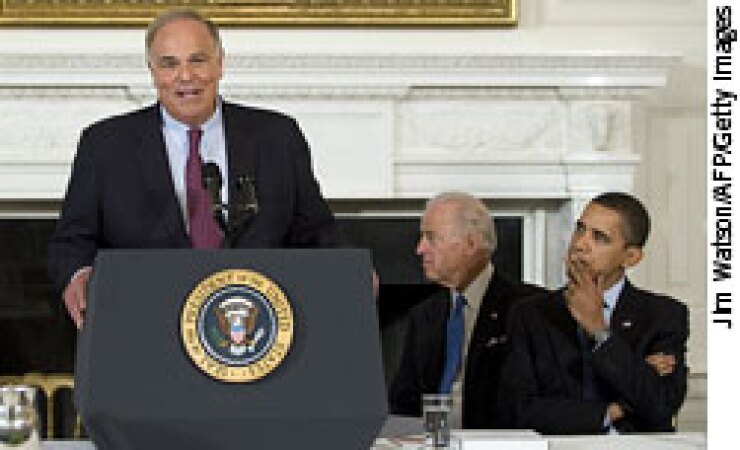
WASHINGTON - Pennsylvania Gov. Edward G. Rendell and public finance expert Felix Rohatyn are calling for the increased use of tax-exempt bonds to help finance infrastructure projects in the near term.
Speaking at a special session on infrastructure Sunday during the National Governors Association's winter summit here, Rendell said tax-exempt bond availability should be expanded, "especially in energy."
Rohatyn - a veteran investment banker who helped save New York City from bankruptcy in the 1970s and recently authored, "Bold Endeavors: How Our Government Built America, and Why It Must Rebuild Now" - agreed that tax-exempt of financing of infrastructure projects would benefit investors and states.
The meeting focused on the outlook for funding infrastructure ranging from water and sewer treatment facilities to highway and public transit projects. Governors honed in on a national infrastructure bank that has been legislatively proposed in the Senate and House and was pitched by President Obama during his campaign.
Rohatyn, who called for the creation of a national infrastructure bank in his book, said it should be capitalized using $60 billion to $70 billion that otherwise would take the form of annual transportation appropriations. The bank would issue bonds and "become self-financing over time," he said.
He also touted public-private partnerships, stressing the value of international private investment in repairing and building the nation's infrastructure. European and international investors should be courted, Rohatyn said.
Indiana Gov. Mitch Daniels, a Republican who spoke during a discussion on P3s, pointed to his state's controversial toll road deal and warned that "to monetize the value of current assets is borrowing from the future."
In that deal, the state leased the Indiana Toll Road for 75 years to a private consortium that included Cintra, Concesiones de Infraestructuras de Transporte of Spain and Macquarie Infrastructure Group of Australia in return for $3.8 billion.
The session's speakers agreed with statements made by governors and experts earlier in the weekend that state and federal governments should attempt to take a broad view of infrastructure financing and construction that links broadband, transportation, energy, and water and sewer infrastructures.
"States really have the opportunity in the next several years" through stimulus funding, highway reauthorization funding, and climate change legislation "to redefine" how they finance infrastructure projects, said Democrat Parris Glendening, former governor of Maryland.
However, participants downplayed states' ability to launch new projects using stimulus funds over the next two years. Rendell said most governors will use stimulus funding for "fix it first" projects because of the strict use-it-or-lose-it, 120-day contractual deadlines included in the stimulus law.
Bruce Katz, founding director of the Brookings Institution's metropolitan policy program, said stimulus dollars will not be spent on "catalytic" or "transformative" infrastructure projects simply because such initiatives have not been developed yet. But state governments may be able to attract private sector financing for those projects, he said.
Katz added that when the $268 billion transportation program authorized by Congress expires at the end of this summer, lawmakers should focus on funding for interstate and intercity transportation and freight corridors.
"This is where a national infrastructure bank should primarily focus," he said. It would "require us to move beyond parochial grabs for money."





